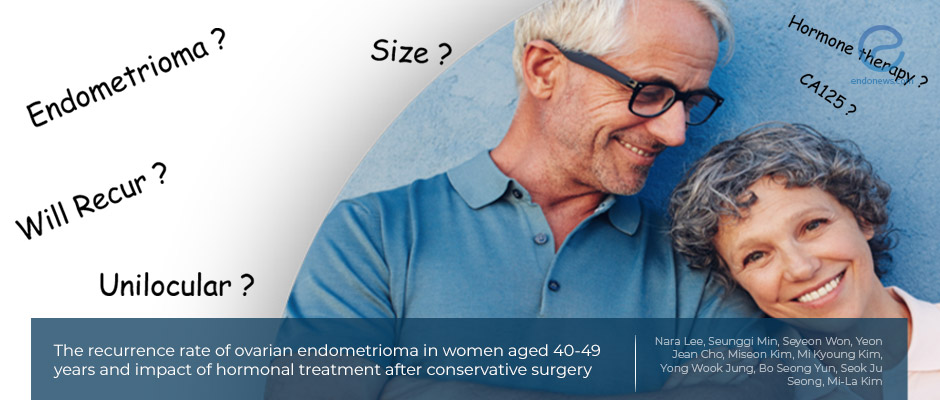The recurrence risk of endometrioma in older age
Dec 2, 2020
Endometrioma recurs even in the pre-menopausal period. Is it possible to prevent it?
Key Points
Highlights:
- In women between 40 and 49 years old, the properties of the endometriotic cyst such as multilocularity, size, and the history of endometrioma surgery are the factors that affect the recurrence rate while taking postoperative hormone medication does not alter it.
Importance:
- The authors aimed to find out the variables that might be associated with the recurrence of endometrioma in elder age and to see whether the application of postoperative hormonal therapy has any effect on it.
What's done here:
- The researchers analyzed the patient charts retrospectively for the patients who had endometrioma surgery between the ages of 40 to 49.
- The inclusion criteria were pathologically confirmed endometrioma, having a follow-up for at least 6 months, and having a TVUltrasound to prove recurrence. All patients were recorded according to their hormone therapy usage and recurrence of symptoms.
- The patients who were postmenopausal at the time of surgery, who had oophorectomy or a diagnosis of a gynecologic malignancy and those without endometrioma were excluded.
- The recurrence rate was determined as the ultrasonographic findings of endometrioma, the size more than 20 mm if single, or the sum of the largest diameters greater than 20mm when multiple.
- The demographics, CA125 levels, size of the endometrioma, ASRM stage, post-operative medications, and time to disease recurrence were evaluated.
Key Results:
- A total of 408 patients who met inclusion criteria were included, they had a median follow-up of 32 months.
- 34 (8.3%) of all patients had recurrence and 11 (2.7%) patients underwent a second surgery.
- The cumulative recurrence rates at 12, 24, 36 and 60 months after conservative surgery were 3.7%, 6.7%, 11.1%, and 16.7%, respectively.
- The statistically significant difference between recurrent and non-recurrent groups was observed in size, cyst characteristics (unilocular versus multilocular), initial CA125 level, and history of previous surgery for ovarian endometrioma. But the use of postoperative medication or the duration of medication did not differ between the 2 groups.
Limitations:
- It is a retrospective study from a single institute and the operations were done by 22 different surgeons.
- The decision of postoperative medication was made according to surgeons' and patients’ preferences, not by standardized indication charts.
- No analyzes made according to symptoms of recurrence, it was only made by the ultrasonographic appearance. The proof for recurrence by histological analyzes not performed as most of the patients were not operated on.
Lay Summary
Ovarian endometrioma is more common in reproductive ages and the recurrence rate is around 20 percent in the first 2 years after the initial surgery. The use of postoperative hormonal therapy is a mutual option to decrease recurrences.
The rate of recurrence for women older than 40 years is not well studied. The effect of hormonal therapy to prevent recurrence may be important in this age because of the high comorbidity of those women and the probable contraindication of using hormonal pills.
In the study conducted by Dr.Kim group. published in "Scientific Reports", the authors have made a logistic regression analysis to understand if there is a correlation between hormonal therapy use and the recurrence rates in women aged between 40 to 49, and the effect of many different variables on the chance of recurrence.
They analyzed the patient charts of 408 women who had endometrioma surgery aged between 40-49 who had a follow-up period of at least 6 months. The recurrence was defined as the ultrasonographic findings of ovarian endometrioma larger than 20mms.
The results showed no correlation between any type of hormonal therapy use and recurrence while a statistically significant difference was shown when the cyst is larger, is multilocular, and if the patient had a history of endometrioma.
The study concluded that given the risk of additional side effects of hormonal therapy use in older ages the use of hormones should be only considered for pain prevention but this would have no preventive effect for recurrence. The authors accepted the retrospective nature of the study and its limitations while suggesting multicenter or prospective further studies.
Research Source: https://pubmed.ncbi.nlm.nih.gov/33020541/
older ages endometrioma recurrence. hormonal therapies

